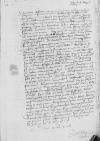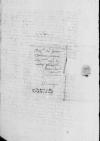Quantum a written over ...⌈... illegible⌈...... illegible⌉aa written over ...⌉fficiar ista tua tam diuturna absentia, non facile dixerim neque vero mei solius iste dolor est, sed illustrissimi ⌊domini marchionis⌋ et aliorum, qui te avide omnes exspectant orig. expectant⌈exspectantexspectant orig. expectant⌉. Sacrificus meus reddidit mihi ⌊⌋, ego autem ⌊⌋ illustrissimo domino ⌊de Nassau⌋ nomine tuo obtuli cum praefatione debita et convenienti accepitque magna cum benevolentia et de te plurimum avideque est sciscitatus. ⌊Levicius⌋ nondum ⌊huc⌋ advenit, sed ex ⌊Tridento⌋ abiit, ut audio, ⌊Venetias⌋, nam ego eum illic non vidi. Dixit mihi ⌊dominus marchio⌋, qualiter ab se superinscribed in place of crossed-out eo⌈eo se se superinscribed in place of crossed-out eo⌉ sumpserit mutuo decem scuta auri allegans ⌊se⌋ privilegium habere in cancellaria redimendum. Vide, quam sit semper sui similis. De ⌊Bernhardo⌋[1] nihildum scio neque adhuc ad nos venit. Locutus orig. Loquutus⌈LocutusLocutus orig. Loquutus⌉ sum cum serenissimo ⌊rege Hungariae⌋ de ⌊Laskeis⌋,[2] quos dicit maximam culpam habere. Dixit praeterea ⌊se⌋ adhuc in ⌊Transylvania⌋ quaedam obtinere et inter ea ⌊Cibinum⌋. De ⌊Turcis⌋ nihil audimus neque curantur a nobis. Heri ingressae sunt ⌊hic⌋ duae reginae ⌊Hungariae⌋ ⌊vidua⌋ et ⌊uxor⌋, in quarum occursum ivit ⌊caesar⌋ et nos alii.
Ex ⌊Erasmo⌋ suscepi litteras[3] per ⌊Levinum⌋ meum. ⌊Is⌋ se tibi plurimum commendat legitque ⌊⌋ tuam pietatemque tuam laudat. Scripsit de bello Turcico ⌊⌋ valde piam, quam videbis, cum ⌊huc⌋ veneris. Reverendissimus dominus ⌊cancellarius⌋ noster eam totam meo instinctu perlegit. Legisset alia quaedam, nisi dysenteria illum impedivisset, qua nunc defunctus melius quidem habet, sed adhuc decumbit. Ceteri bene valent.
⌊Elector Saxoniae⌋ est ⌊Augustae⌋ habens secum ⌊Lutherum⌋, ⌊Melanchtonem⌋, ⌊Ionam⌋, ⌊Pomeranum⌋. ⌊Eo⌋ ventura est magna nobilitas. Nos ⌊hic⌋ subsistemus X aut XII dies, nam conventus est provincialis indictus ⌊Hallae⌋, ubi consultabitur de resistendo ⌊Turcis⌋. Quid de verpis meis agendum sit, nescio. Aegre ⌊caesar⌋ nunc tandem litteris subscripsit. Consilium mihi impartiri non potuit ⌊senex⌋ morbo impediente. Rogavit, ut se dimitterem, donec convalesceret. Itaque ⌊hic⌋ haereo. Hoc est etiam in causa, quominus de ⌊Hylario⌋ quicquam transigere potuerim. Nescio, an ad te hae litterae perventurae sunt, nam ego illas tradidi oratori illustrissimi ⌊ducis Mantuae⌋.[4] Si per valetudinem potes, ad nos quamprimum venies. Reverendus dominus ⌊abbas Middelburgensis⌋ per litteras suas ad m written over t⌈t m m written over t⌉e tibi salutem dicit. Commendat etiam se dominus ⌊Anthonius⌋ et ego plurimum quidvis magis optans, quam te diutius carere.


 UUB, H. 154, f. 51v
UUB, H. 154, f. 51v